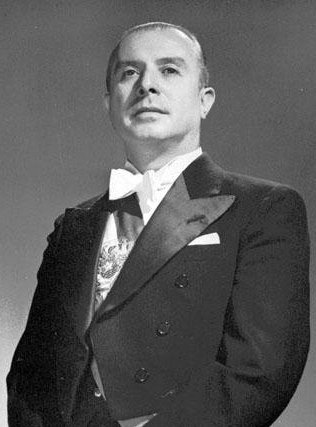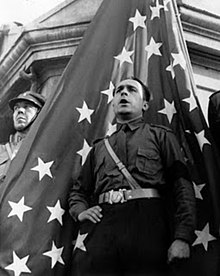
Juan Antonio Ríos Morales was a Chilean political figure who served as president of Chile from 1942 to 1946, during the height of World War II. He died in office.

The Socialist Party of Chile is a centre-left political party founded in 1933. Its historic leader was President of Chile Salvador Allende, who was deposed in a coup d'état by General Augusto Pinochet in 1973. The military junta immediately banned socialist, Marxist and other leftist political parties. Members of the Socialist party and other leftists were subject to violent suppression, including torture and murder, under the Pinochet dictatorship, and many went into exile. Twenty-seven years after the 1973 coup, Ricardo Lagos Escobar won the Presidency as the Socialist Party candidate in the 1999–2000 Chilean presidential election. Socialist Michelle Bachelet won the 2005–06 Chilean presidential election. She was the first female president of Chile and was succeeded by Sebastián Piñera in 2010. In the 2013 Chilean general election, she was again elected president, leaving office in 2018.

Gabriel Enrique González Videla was a Chilean politician and lawyer who served as the 24th president of Chile from 1946 to 1952. He had previously been a member of the Chamber of Deputies from 1930 to 1941 and senator for Tarapacá and Antofagasta from 1945 to 1946. A long-time member and leader in the Radical Party, he left the party in 1971 over its support for socialist president Salvador Allende. From 1973 until his death in 1980 he became an active collaborator and participant in the dictatorship of Augusto Pinochet, acting as vice president of the Council of State from 1976 onwards. As vice president of the council, he helped draft the current Chilean constitution of 1980.

Jorge González von Marées, also known as El Jefe was a Chilean political figure and author who served two terms as a member of the Chamber of Deputies and as mayor of Ñuñoa.

The Biographical Dictionary of the Extreme Right Since 1890 is a reference book by Philip Rees, on leading people in the various far right movements since 1890. It contains entries for what the author regards as "the 500 major figures on the radical right, extreme right, and revolutionary right from 1890 to the present" . It was published, as a 418-page hardcover, in New York by Simon & Schuster in 1990 (ISBN 0-13-089301-3).

Arturo Fortunato Alessandri Palma was a Chilean political figure and reformer who served thrice as president of Chile, first from 1920 to 1924, then from March to October 1925, and finally from 1932 to 1938.

The National Socialist Movement of Chile was a political movement in Chile, during the Presidential Republic Era, which initially supported the ideas of Adolf Hitler, although it later moved towards a more local form of fascism. They were commonly known as Nacistas.
Carlos Keller Rueff was a far-right Chilean writer, historian, and political figure.

The Radical Party was a Chilean political party. It was formed in 1863 in Copiapó by a split in the Liberal Party. Not coincidentally, it was formed shortly after the organization of the Grand Lodge of Chile, and has maintained a close relationship with Chilean Freemasonry throughout its life. As such, it represented the anticlericalist position in Chilean politics, and was instrumental in producing the "theological reforms" in Chilean law in the early 1880s. These laws removed the cemeteries from the control of the Roman Catholic Church, established a civil registry of births and death in place of the previous recordkeeping of the church, and established a civil law of matrimony, which removed the determination of validity of marriages from the church. Prior to these laws, it was impossible for non-Catholics to contract marriage in Chile, and meant that any children they produced were illegitimate. Non-Catholics had also been barred from burial in Catholic cemeteries, which were virtually the only cemeteries in the country; instead, non-Catholics were buried in the beaches, and even on the Santa Lucia Hill in Santiago, which, in the 19th century, functioned as Santiago's dump.

The Presidential Republic is the period in the history of Chile spanning from the approval of the 1925 Constitution on 18 September 1925, under the government of Arturo Alessandri Palma, to the overthrow of the Popular Unity government headed by the President Salvador Allende on 11 September 1973. The period is concurrent with the "Inward Development" period in Chilean economic history.
The Popular Freedom Alliance was a Chilean political party during the Presidential Republic Era, founded in 1938 for the coming presidential election.
The Democratic Alliance of Chile was a coalition of left-wing parties from 1942 to 1946, which succeeded to the Popular Front headed by Pedro Aguirre Cerda's government (1938–1941). It included the Radical Party, the Socialist Party, the Communist Party, the Democratic Party and the Workers' Socialist Party, and was also supported by the Confederación de Trabajadores de Chile (CTCH) trade-union. The coalition initial aim was to stand united before the 1942 presidential election, which were won by the Democratic Alliance's candidate, Juan Antonio Ríos, who formed a cabinet which was supported by the main parties of the Democratic Alliance. The coalition dissolved itself after the communists were outlawed by Gabriel Gonzalez Videla in 1947.
The Popular Front in Chile was an electoral and political left-wing coalition from 1937 to February 1941, during the Presidential Republic Era (1924–1973). It gathered together the Radical Party, the Socialist Party, the Communist Party, the Democratic Party and the Radical Socialist Party, as well as organizations such as the Confederación de Trabajadores de Chile (CTCH) trade-union, the Mapuche movement which unified itself in the Frente Único Araucano, and the feminist Movimiento Pro-Emancipación de las Mujeres de Chile (MEMCh).

The Radical Governments of Chile were in power during the Presidential Republic from 1938 to 1952.

The Agrarian Labor Party was a Chilean political party supporting the candidacy of Carlos Ibáñez del Campo for the 1952 presidential election. Formed in 1945, it was dissolved in 1958.

Fascism in South America encompasses an assortment of political parties and movements modeled on fascism. Although the ideology originated in and is primarily associated with Europe, fascism crossed the Atlantic Ocean during the interwar period and influenced South American politics. In particular, Italian fascism had a deep impact in the region, both directly and indirectly.
Events in the year 1973 in Chile.

Oscar Alex Enrique Schnake Vergara was a Chilean politician and physician. He was a founder member of the Chilean Socialist Party and close to President Pedro Aguirre Cerda (1938–1941).

Chilean nationalism is the nationalism of Chilean people and Chilean culture. It began as a strain of political thought that originated between 1904 and 1914 with the rise of the centenary essayists, the birth of the Nationalist Party and the reactivation of the authoritarian political discourse of the statesman Diego Portales.














